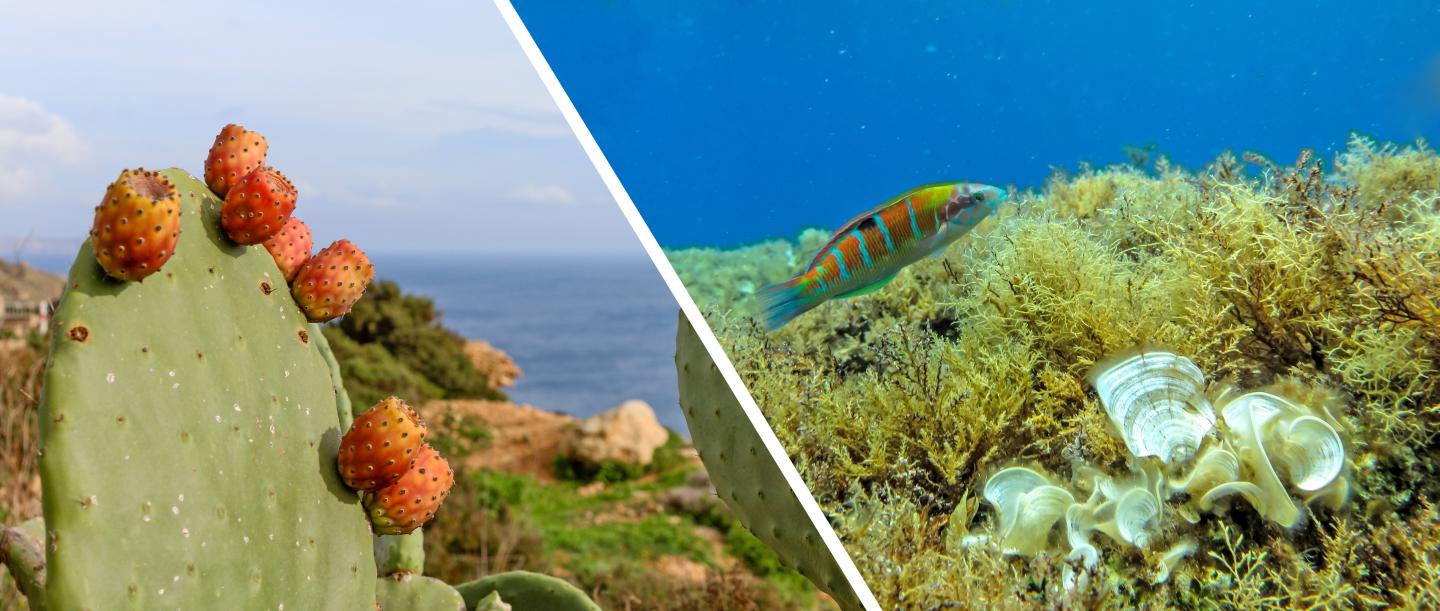
Credit: Stephanie Ghio
The Mediterranean is a haven for lovers of crystal-clear seas and sun-kissed landscapes. Now, thanks to the work of scientists from the University of Malta and the Centre National de la Recherche Scientifique (CNRS/University of Bordeaux), it has the added appeal of being an actual fountain of youth.
Alzheimer's and Parkinson's disease are classic age-related disorders characterised by the accumulation of sticky protein clumps that over time damage the nervous system to erode mobility or memory. The human suffering they cause, as well as the strain on healthcare, are enormous. But there is hope on the horizon. Chemicals extracted from the prickly pear and brown seaweed, two ubiquitous Mediterranean plants, have been elevated to possible drug candidates to combat the neurodegenerative diseases.
'We have long been screening plants scattered across the Mediterranean for small molecules that interfere with the build-up of toxic protein aggregates. The robust effects of chemicals derived from the prickly pear and brown seaweed confirm that our search has certainly not been in vain,' said study co-author Neville Vassallo, MD, PhD, professor of molecular physiology at the University of Malta School of Medicine and Surgery.
The research team began by running tests to determine the effect of the plant extracts on brewer's yeast brimming with beta-amyloid clumps, a hallmark of Alzheimer's disease. Following exposure to the chemicals, the yeast's health improved dramatically, a result that encouraged the researchers to evaluate the molecules on fruit flies which had been genetically modified to develop Alzheimer's symptoms.
On regular treatment with seaweed extract, the median lifespan of diseased flies was prolonged by two days. A greater four-day extension was observed when prickly pear extract was administered. Considering that one day in the life of a fruit fly is equivalent to around one year in humans, the results are dramatic. Interestingly, the mobility of sick flies was improved by about 18% after treatment, highlighting a significant improvement.
Scientists also discovered that the substances prolonged the lifespan of flies with brains overloaded with alpha-synuclein, a gummy protein implicated in Parkinson's disease, hence, underscoring an effect on neurodegenerative mechanisms shared by both Alzheimer's and Parkinson's disease. To this end, they found that the plant-derived molecules interfered with the build-up of both beta-amyloid and alpha-synuclein proteins to generate clumps that are less toxic to neurons. The study is reported in the January issue of the journal Neuroscience Letters.
Lead study author Ruben J. Cauchi, PhD, a faculty member at the Centre for Molecular Medicine and Biobanking of the University of Malta, remarked: 'We believe that the discovery of bioactive agents that target pathways that are hit by multiple neurodegenerative conditions is the most viable approach in our current fight against brain disorders. A clear advantage of the drugs used in this study is that, in view of their excellent safety profile, they are already on the market as nutraceuticals and cosmeceuticals'.
Right now, the research team is working closely with the company that extracts the magic molecules, the Institute of Cellular Pharmacology, to make the most of the discovery. If the findings hold in clinical trials, the Mediterranean is set to become a source for the 'elixir of life'.
Study co-authors from the University of Malta were Michelle Briffa, Stephanie Ghio, Johanna Neuner, Alison J. Gauci, Rebecca Cacciottolo, and Mario Caruana. Study co-authors from the University of Bordeaux were Christophe Cullin and Christelle Marchal. The research was funded by the Malta Council for Science & Technology, the University of Malta, CNRS, and the Embassy of France to Malta.
###
Publication:
Briffa, M., Ghio, S., Neuner, J., Gauci, A.J., Cacciottolo, R., Marchal, C., Cullin, C., Vassallo, N., & Cauchi, R.J. Extracts from two ubiquitous Mediterranean plants ameliorate cellular and animal models of neurodegenerative proteinopathies. Neurosci. Lett. (2016), http://dx.doi.org/10.1016/j.neulet.2016.11.058
Media Contact
Dr. Ruben J. Cauchi
[email protected]
356-234-02145
@uniofmalta
http://www.um.edu.mt/
############
Story Source: Materials provided by Scienmag





